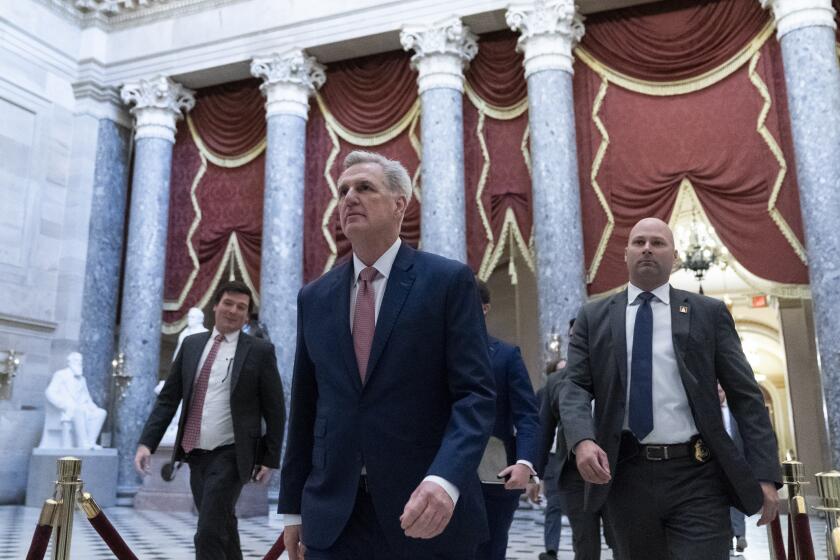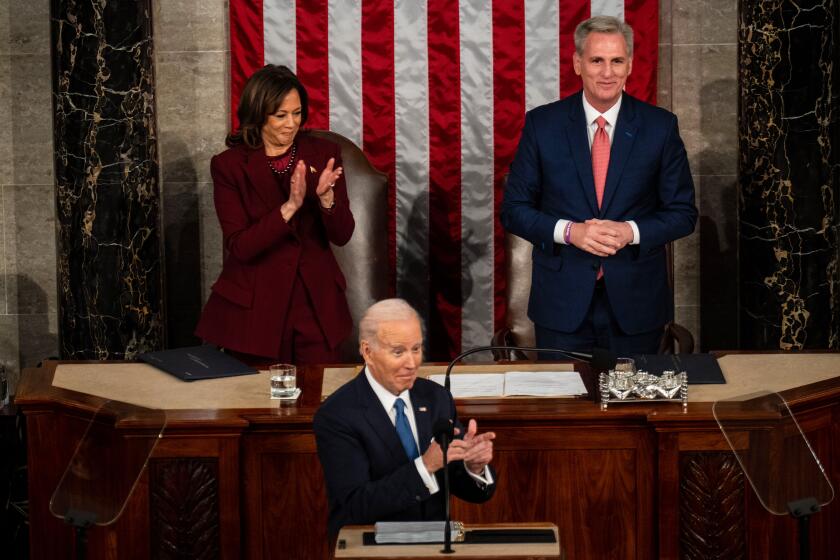Solutions: Biden still has time to nudge the federal budget closer to sanity

- Share via
The U.S. fiscal outlook has dramatically deteriorated since the last time we ran a surplus in 2001, and President Biden — like Democratic and Republican presidents before him — shares some responsibility for our high and rising debt. But it’s not too late to start turning things around.
During his time in office, Biden approved more than $4 trillion of new 10-year borrowing, debt-financing everything from COVID relief to infrastructure spending to student debt cancellation. This borrowing helped lift inflation to a 40-year high and push interest rates well above recent levels. It also added to an already high and rising national debt.
A new budget rule allows Congress to pass mammoth tax cuts without offsetting the revenue loss. That means the cost all gets added to the deficit and the debt.
As a result of borrowing approved by the last four administrations, along with the built-in growth of our health and retirement programs, the national debt will soon approach record levels as a share of the economy. So too will the cost of interest paid by taxpayers on the national debt, which already exceeds spending on Medicare or national defense. And deficits will total about $2 trillion per year.
But Biden’s fiscal record isn’t all bad. Coming out of the COVID pandemic, he oversaw a tremendous economic recovery, which has helped limit growth in the ratio of debt to gross domestic product. The president also negotiated and signed into law the bipartisan Fiscal Responsibility Act, which restored appropriations caps and is projected to save $1.5 trillion over a decade. And the Inflation Reduction Act, though a mixed fiscal bag overall, included important reforms to lower Medicare drug prices and improve tax enforcement.
Don’t blame Biden for a lack of fiscal leadership. Until Republicans drop their opposition to new taxes, neither Medicare nor Social Security should be cut.
Now, with just over two months left in his term, Biden has the opportunity to build on these fiscal successes and make right some of these fiscal failures.
That starts with protecting his legacy on tax compliance. Every year, households and businesses underpay their taxes by $600 billion. The combination of tax cheating and honest mistakes adds tremendously to our debt. Every president from Reagan through Trump proposed to increase funding to the Internal Revenue Service to reduce this “tax gap.” Biden actually succeeded, persuading Congress to appropriate $80 billion to the IRS to upgrade its information technology, improve its customer service and strengthen its enforcement.
Unfortunately, this funding is under threat. Congress has already rescinded more than a quarter of the funds to pay for other spending, and an end-of-year appropriations deal could go further. Another $20 billion of cuts from the IRS would reduce tax revenue by more than $65 billion, according to the Congressional Budget Office.
Biden should insist against this, threatening to veto any effort to reduce IRS funding, which only encourages further tax cheating. He should also work with Congress to address excessive payments under the pandemic-era employee retention credit, which has cost many times more than intended and turned into a lightning rod for fraud.
Beyond the IRS funding, Biden should insist appropriations levels stick to the caps that he negotiated on a bipartisan basis. There will be tremendous pressure from both parties to spend more. Republicans will want to increase funding on defense, Democrats will want to increase nondefense funding, and both will insist that these incremental changes will have little effect on the fiscal outlook.
No question, this country has many unmet needs — both when it comes to national security and to our domestic priorities. But Congress should fund those priorities by cutting spending elsewhere. There is tremendous room to cut waste, improve efficiency, and scale back or eliminate projects and programs that aren’t worth their costs or aren’t working. Failing to abide by spending caps this year would make any future enforcement harder and would send the signal that Congress can spend without restraint. Biden should put his foot down.
There’s also much that the president can do through executive action. He could start by withdrawing his various student debt cancellation schemes. These policies are costly, inflationary and poorly targeted — most of the benefit will go to those with graduate degrees and very high lifetime earnings. Student debt cancellation is also likely to boost tuitions and reduce the quality of higher education, as schools will be able to charge more and deliver less if potential students know they are unlikely to be responsible for much of the cost. These executive actions also clearly go beyond the powers intended for the president, which the Supreme Court and other courts have recognized by declaring some of these schemes illegal and putting holds on others.
On the other hand, this administration has appropriately and intelligently used its clearly defined authority to begin to tackle fraud and other excesses in the Medicare Advantage program. Biden officials should do more here where possible and work in the transition to help the incoming Trump administration understand the importance of a well-run and cost-effective Medicare Advantage program.
Most important, Biden should use the presidential bully pulpit to make the case for paying for new priorities, reducing our debt and securing federal trust funds. Social Security is only nine years away from insolvency, while Medicare is only 12 years away. We cannot afford for future administrations to ignore these challenges and continue the cycle of borrowing for everything. We need leaders to level with the American people about the challenges ahead — challenges Biden understands well. And it is not too late.
Marc Goldwein is the senior vice president of and senior policy director for the Committee for a Responsible Federal Budget.
More to Read
A cure for the common opinion
Get thought-provoking perspectives with our weekly newsletter.
You may occasionally receive promotional content from the Los Angeles Times.












